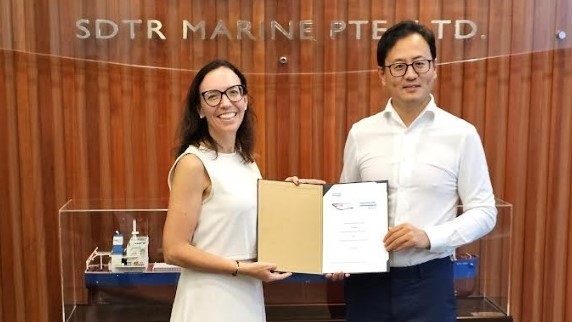Classification society DNV has entered into a Joint Development Project (JDP) with Singapore-based shipping company SDTR Marine to cooperate on a Carbon Capture and Storage (CCS) feasibility study for the latter’s 85,000 dwt Kamsarmax bulk carrier.
As part of the JDP, DNV and SDTR Marine will collaborate on a techno-economic analysis of CCS implementation aboard the bulk carriers. Utilizing DNV’s FuelPath, the study aims to evaluate the economic viability of different fuel and technology approaches under various fuel and CO2 price scenarios. The model takes into account future decarbonization mandates and SDTR Marine’s ambitious emission targets, in alignment with the ship owner’s drive to improve energy efficiency and contribute towards decarbonizing shipping.
Gao Dehui, CEO of SDTR Marine Pte Ltd, said “CCS technology aboard maritime vessels represents a significant advancement in reducing the environmental footprint of the shipping industry. One of the most positive aspects of this technology is its ability to significantly decrease carbon emissions from ships. The exploration of CCS technology on our vessels epitomizes SDTR Marine’s commitment to environmental responsibility. Showcasing our continuous efforts to explore various ways of reducing carbon emissions in maritime operations and operate more sustainably.”
Echoing this sentiment, Cristina Saenz de Santa Maria, Regional Manager South East Asia, Pacific & India, Maritime at DNV said, “As the maritime industry advances towards decarbonization, shipowners must strategically plan for regulatory compliance and operational efficiency. We are excited to be working with SDTR Marine to explore cost-effective fuel strategies to support their net-zero goals. Leveraging DNV’s global network and the expertise of our Maritime Decarbonization Centre of Excellence in Singapore, we are well-positioned to guide the industry through this energy transition in compliance with IMO’s emission targets.”
CCS has gained increasing attention as the industry actively seeks innovative solutions to curb its carbon footprint. In 2023, DNV entered into a similar cooperation to explore the feasibility of CCS for a containership and Kamsarmax bulk carrier newbuild.
Source: DNV.
Tags: CCS, CO2, DNV



Recent Posts
PIL Conducts First Simultaneous Cargo and LNG Bunkering in Singapore
NYK Takes Delivery of LNG-Fuelled Capesize Bulker SG Dawn
Swire Shipping joins Achilles Maritime Network to strengthen supply chain sustainability and compliance
L&T Open to Minority Stake Sale in Green Hydrogen and Ammonia Projects
Government Briefs Parliament on Oil, Gas, and Alternative Fuel Projects
Angola’s NVS Targets Green Methanol Production for Multiple Sectors
CBH Group Trials Biofuels to Cut Maritime Emissions in Grain Exports to Europe
Grimaldi Group Takes Delivery of Ammonia-Ready PCTC Grande Tianjin